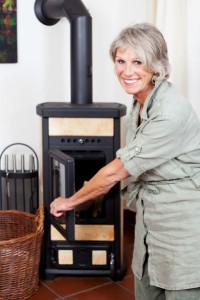We are in the thick of summer and none of us want to think any more about heat, but summer is the best time to schedule an inspection of your chimney with regard to your wood burning stove. Just as a squirrel must store acorns for the winter, homeowners must also prepare for colder weather so that their heating system works efficiently and safely when the frosty temperatures arrive.
Annual inspection by a certified chimney sweep is strongly recommended for a couple of reasons. A sweep is trained to look for particular kinds of deterioration such as cracks, leaks, warping and baffle gaps. What is a baffle gap? A baffle gap is located in the fire box and keeps the direct heat from hitting the stove — this is necessary for an effectual burn and helps prevent creosote buildup. This is a safety measure inside your stove.
There is one caveat to the annual inspection…that is dependent on the type of wood you typically burn and the size of the fire. Burning green or wet wood (not properly air-dried wood) can increase the amount of creosote that accumulates in your chimney. It also matters what size fire you build. Smaller fires (using less wood) makes for a more proficient burn – hot and fast. This produces less creosote. And the accrual of creosote is dangerous because it is highly flammable.
There are also a few things you as a homeowner can do to get your stove ready for toasty evenings. Vacuum or scoop ash into a sealed metal bucket. Always place the container outside and safely away from you. Don’t leave on your deck or too close to your siding. Ash is a fertilizer, so you can spread it on your garden! Just make sure you are spreading it evenly and do not put more than one coating, as this can be too much alkalinity. Check the moving parts of your stove to ensure that all are in proper working order.
A certified sweep will clear out your flue and inspect, so there is no need to get on the roof and endanger your safety. Cleaning your chimney is a strenuous job and you must know what you are doing in order to prevent damage to you, your chimney and your heating system as a whole. Remember, creosote is the leading cause of chimney fires. You need to know that this potential peril is removed from your chimney, so that when the nights get nippy, you can warm up without worry.

